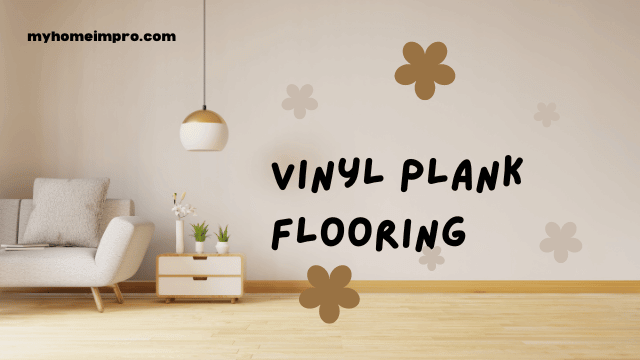Vinyl plank flooring has become quite popular in recent years due to its versatility, durability, and cost-effectiveness. It can, for instance, mimic the look of natural hardwood, making it a preferred choice for homeowners and businesses alike.
In this comprehensive guide, we look at the various advantages and disadvantages of vinyl plank flooring. We also provide valuable insights and expert advice to help you make an informed decision for your flooring needs.
Let’s get started.
Pros & Cons of Installing Vinyl Plank Flooring
Table of Contents
Before installing vinyl plank flooring, it is important to understand both its benefits and drawbacks.
Advantages of Vinyl Plank Flooring
Realistic Wood Look and Feel
Vinyl plank flooring offers a remarkable resemblance to natural hardwood, replicating its texture and grain patterns. Manufacturers use advanced printing techniques to achieve stunning visuals that closely mimic different wood species, allowing you to enjoy the beauty of wood without the associated maintenance or costs.
Durability and Longevity
Vinyl plank flooring is highly durable and resistant to wear and tear. Its top layer, often fortified with urethane or enhanced with enhanced polyurethane, provides excellent scratch and stain resistance. When properly maintained, vinyl plank flooring can last for decades, making it a long-term investment for your space.
Water Resistance
Unlike traditional hardwood flooring, vinyl planks are inherently waterproof. This water-resistant property makes them ideal for areas prone to moisture, such as kitchens, bathrooms, and basements, as they can withstand spills and accidents without warping or other damage.
Easy Installation
Vinyl plank flooring typically employs click-lock or adhesive installation, making it a DIY-friendly option for homeowners. These planks can be easily installed over existing floors, saving time and money on floor preparation.
Comfort and Sound Absorption
Vinyl plank flooring offers a comfortable and cushioned surface. Additionally, its sound-absorbing properties reduce noise levels, creating a quieter, more peaceful environment.
Low Maintenance
One of the significant advantages of vinyl plank flooring is its low maintenance requirements. Regular sweeping and occasional damp mopping are sufficient to keep it clean and looking fresh. Unlike hardwood, it does not require refinishing or waxing, saving both time and money.
Affordability
Vinyl plank flooring is a cost-effective alternative to hardwood and other flooring options. Its reasonable price per square foot makes it a budget-friendly choice for homeowners looking to achieve the look of hardwood flooring without spending too much.
Disadvantages of Vinyl Plank Flooring
Susceptibility to Fading
Vinyl plank flooring may fade when exposed to direct sunlight over extended periods. While modern manufacturing techniques have improved UV resistance, it is essential to consider this factor, especially in rooms with large windows or intense sunlight.
Vulnerable to Sharp Objects
Although vinyl plank flooring is durable, it is not entirely impervious to sharp objects like heavy furniture legs or pet claws. Care should be taken to use furniture pads and avoid dragging heavy items across the floor to prevent scratches.
Difficult to Repair
While vinyl plank flooring is known for its durability, repairing damaged sections can be challenging. In some cases, individual planks may need to be replaced, which can be a more involved process than repairing hardwood floors.
Volatile Organic Compounds (VOCs)
Some vinyl plank flooring products may emit VOCs, which are harmful chemicals that can affect indoor air quality. When purchasing vinyl flooring, look for low-VOC or phthalate-free options to ensure a healthier living environment.
Limited Resale Value
Unlike natural hardwood flooring, vinyl plank flooring may not add significant resale value to your property. If you are interested in flooring that does improve ROI, vinyl plank flooring is not the best option.
Not Biodegradable
Vinyl plank flooring is not biodegradable, making it less eco-friendly than other flooring options. If environmental sustainability is a top concern, consider alternative eco-conscious flooring materials.
Frequently Asked Questions About Vinyl Plank Flooring
Can vinyl plank flooring be installed in bathrooms and kitchens?
Yes. Its water resistance makes it an excellent choice for bathrooms and kitchens, where moisture is a concern.
Does vinyl plank flooring require underlayment?
In most cases, it does not. However, using underlayment can provide additional sound insulation and enhance the floor’s comfort.
How do I clean and maintain vinyl plank flooring?
Regular sweeping and occasional damp mopping with a mild detergent are typically sufficient. Avoid harsh chemicals and abrasive cleaners.
Can I install vinyl plank flooring over existing tiles?
Yes, as long as the surface is flat, clean, and in good condition.
Is vinyl plank flooring suitable for high-traffic areas?
Yes, vinyl plank flooring’s durability makes it suitable for high-traffic areas in homes and commercial spaces.
Can vinyl plank flooring be used with radiant floor heating?
Yes, many vinyl plank flooring products are compatible with radiant floor heating systems, providing warmth and comfort.
Vinyl plank flooring offers numerous advantages. This makes it an attractive and practical choice for various spaces. By carefully weighing its pros and cons and considering your specific needs, you can confidently decide whether vinyl plank flooring is the right fit for your home or business. Embrace the benefits of vinyl plank flooring while understanding its limitations and you will enjoy a beautiful and functional floor that stands the test of time. Visit your nearest home improvement store to start shopping for vinyl plank flooring.

